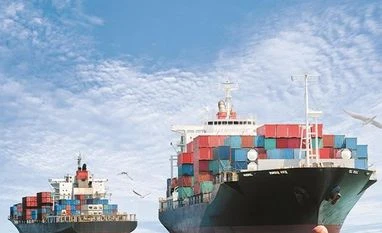With IMO (International Maritime Organization) 2020 regulation round the corner, the global container shipping industry is expected to witness a cost escalation of $15 billion, experts said.
“A new component called Low Sulphur Surcharge (LSS) will be added to the freight rate when ships start using cleaner fuel.
LSS on the busy Asia-Europe trade route would be $250 for forty-foot container, while on the Far East to Indian ports, it would be $100 for the same, taking total freight rate up by the same quantum,” Vishal Kashav, senior analyst-maritime supply chain at Drewry Shipping Consultants told Business Standard.
The IMO has mandated that sulphur content in shipping fuel must be reduced to 0.5 per cent from the current 3.5 per cent starting January 2020.
The body has laid out this mandate due to high sulphur emissions that have caused damage to marine environment, especially in Northern European countries, with UK suffering the most.
IMO2020 regulations compel shipping companies to either fit scrubbers or use cleaner fuel for its fleet. Scrubber equipment is fitted to clean fuel on the ship. It is a one-time cost and an alternative to clean fuel usage.
APM-Maersk, Mediterranean Shipping Company (MSC), China Ocean Shipping Company (COSCO), CMA-CGM, Hapag-Llyod, Ocean Network Express (ONE), Evergreen Line, Yang Ming Marine Transport, Hyundai Merchant Marine, Pacific International Lines (PIL) are among the top 10 container shipping companies in the world.
Global players such as Maersk and France-based CMA-CGM are present in India’s container shipping market.
"In order to recover the increased costs, we have introduced two mechanisms for our customers, the Environmental Fuel Fee (EFF) for short-term contracts (less than 3-months) with effect from December 1, 2019 and Bunker Adjustment Factor (BAF) for long-term customers to be effective from January 1, 2020," Steve Felder, managing director at Maersk South Asia said in an emailed response.
The company has already established joint initiatives with Vopak, Koole and PBF Logistics for 0.5 per cent compliant fuel storage and processing facilities in Rotterdam, Netherlands and New Jersey in United States.
The EFF and new BAF levels will vary by trade route corridor, based on a transparent formula, he said. The freight hike is purely dependent on fuel price and will vary as long as the fuel prices vary. Also shipping being a low margin business, the industry cannot absorb the additional costs resulting from the new IMO 2020 regulations, and Maersk therefore intends to pass it on increase in cost to the customers entirely, said Felder.
State-owned Shipping Corporation of India (SCI) is also present in container shipping business but it contributes only 5 per cent to the company's total revenue.
"The retrofit scrubber cost is being priced at $4-$5 million per very large container ship. Retrofit scrubber would mean ships that are already active and need to undergo scrubber fitting immediately. Alongside, for a new built container vessel the cost is comparatively less around $3 million," said Kashav from Drewry.
Meanwhile, Indian shipping companies such as Essar Shipping, Shipping Corporation of India (SCI) and Great Eastern Shipping among others, which are largely in bulk trade of both dry and liquid, are looking to have a combination of scrubbers clean fuel option depending on their cost calculations.
Investments
- GE Shipping to spend $20 million on scrubbers for 7 ships
- Essar Shipping to invest $6 million for 4 ship scrubbers
- Maersk to pass on cost increase to customers entirely
- Intra-Asia trade route to see higher freight rate vs East-West route
"We are installing scrubbers on seven of our larger ships and total cost of installation on these ships is around $20 million. For the rest of the fleet, we will just switch to the low sulphur fuel oil/marine gas oil (LSFO)/(MGO) from Jan 2020. Installation on one ship is already done, the rest will be done by Jan/Feb 2020," Great Eastern Shipping official said via email responses.
The company has a fleet size of 47 vessels and is after state-owned Shipping Corporation of India with fleet size of 60 vessels. SCI has small presence in container segment with five vessels in its kitty.
"We are installing scrubbers and will make capital investments of about $6 million in four out of our 12 owned vessels. Rest has been lined up for installation of scrubbers,” informed Ranjit Singh, executive director and chief executive officer (CEO), Essar Shipping.
While cost rise for shipping companies in inevitable from January, analysts were of the view that actual global freight rate hike could remain pressured in select regions.
“Overall freight rates will surely go up but the East-West trade routes could witness some pressure due to lower trade growth because of the US-China war, higher competition and overall weak demand due to global downturn,” said an analyst on condition of anonymity.
Comparatively, intra-Asia and North-South trade routes that are smaller routes but have trade growing due to presence of developing economies such as India, Iran and Russia among others will see a higher quantum jump in freights, he added.
The US represents the largest market for container shipping followed by Canada in North America. In Europe, Germany, UK, Spain, Italy, and France hold the major share of the container shipping market. In Asia, with manufacturing units on a rise, demand for containerised cargo is expected to go up. Japan, China, and India are expected to be the fastest-growing container shipping market in this region, said industry officials.
Unlock 30+ premium stories daily hand-picked by our editors, across devices on browser and app.
Pick your 5 favourite companies, get a daily email with all news updates on them.
Full access to our intuitive epaper - clip, save, share articles from any device; newspaper archives from 2006.
Preferential invites to Business Standard events.
Curated newsletters on markets, personal finance, policy & politics, start-ups, technology, and more.
)